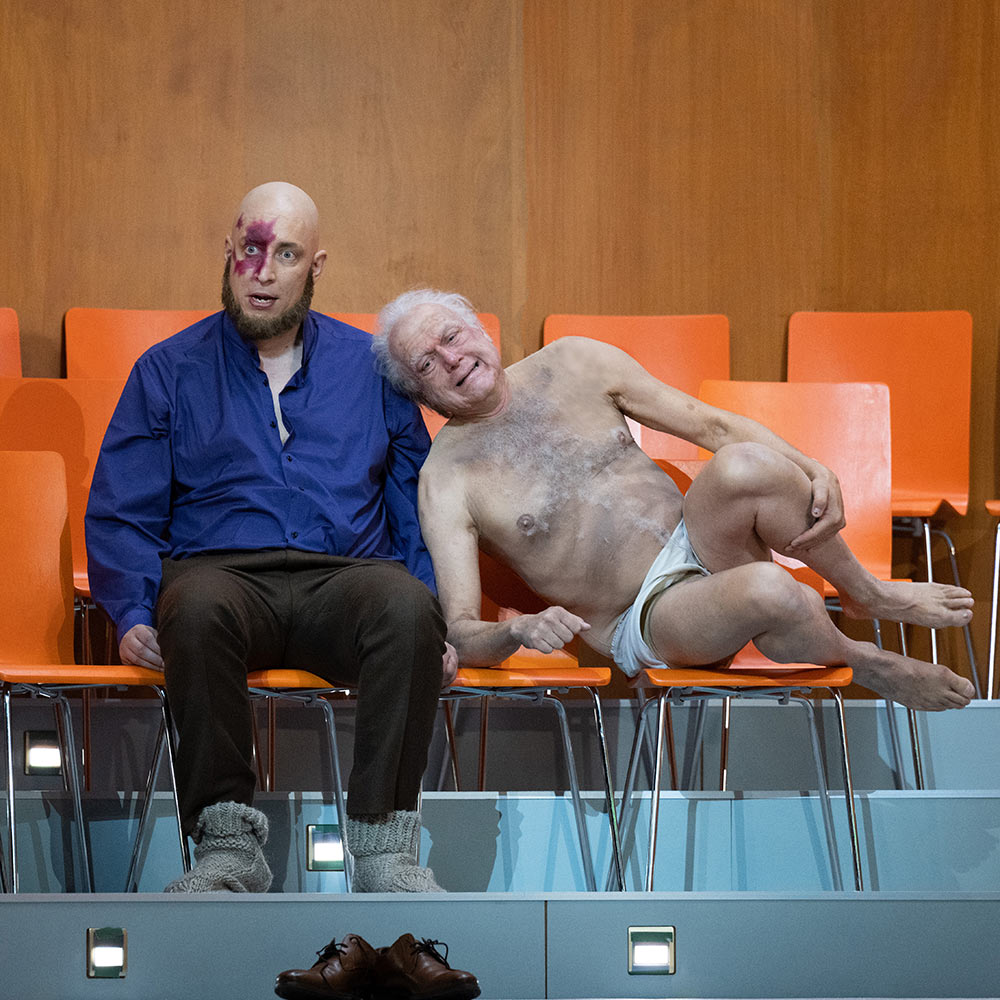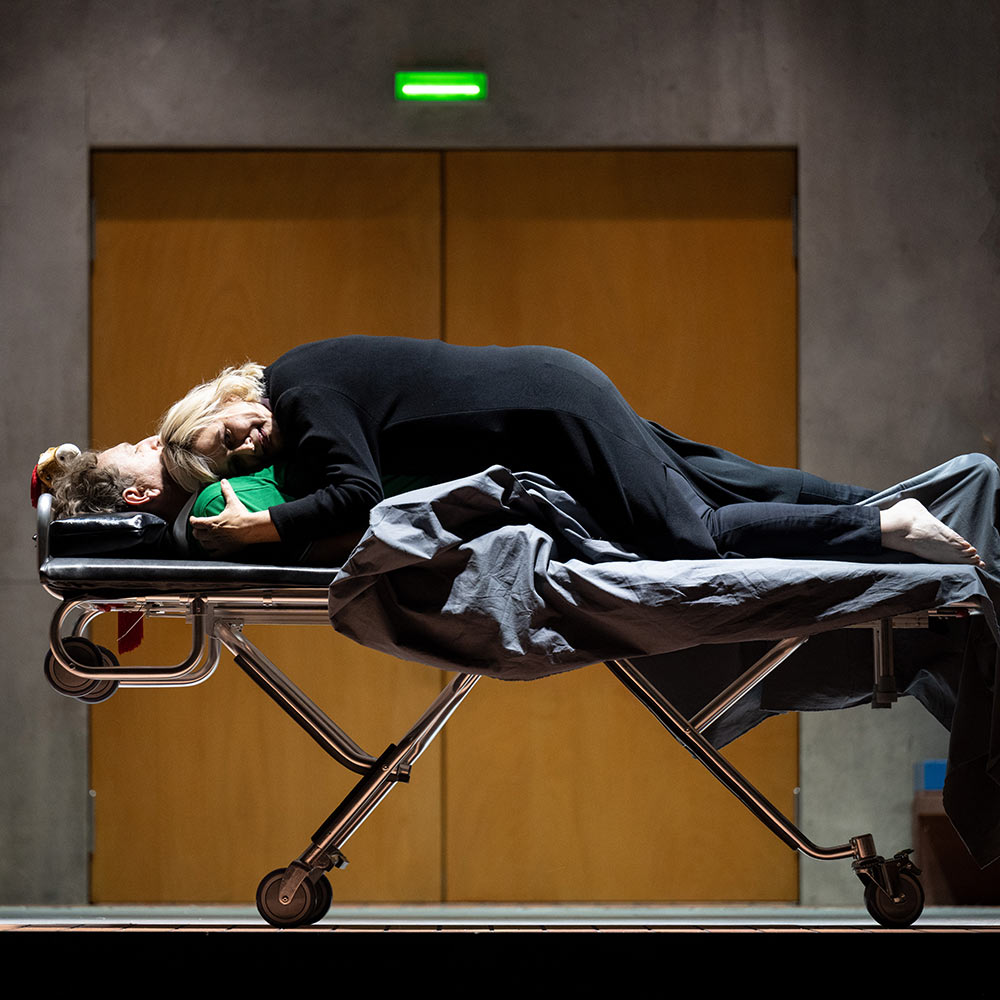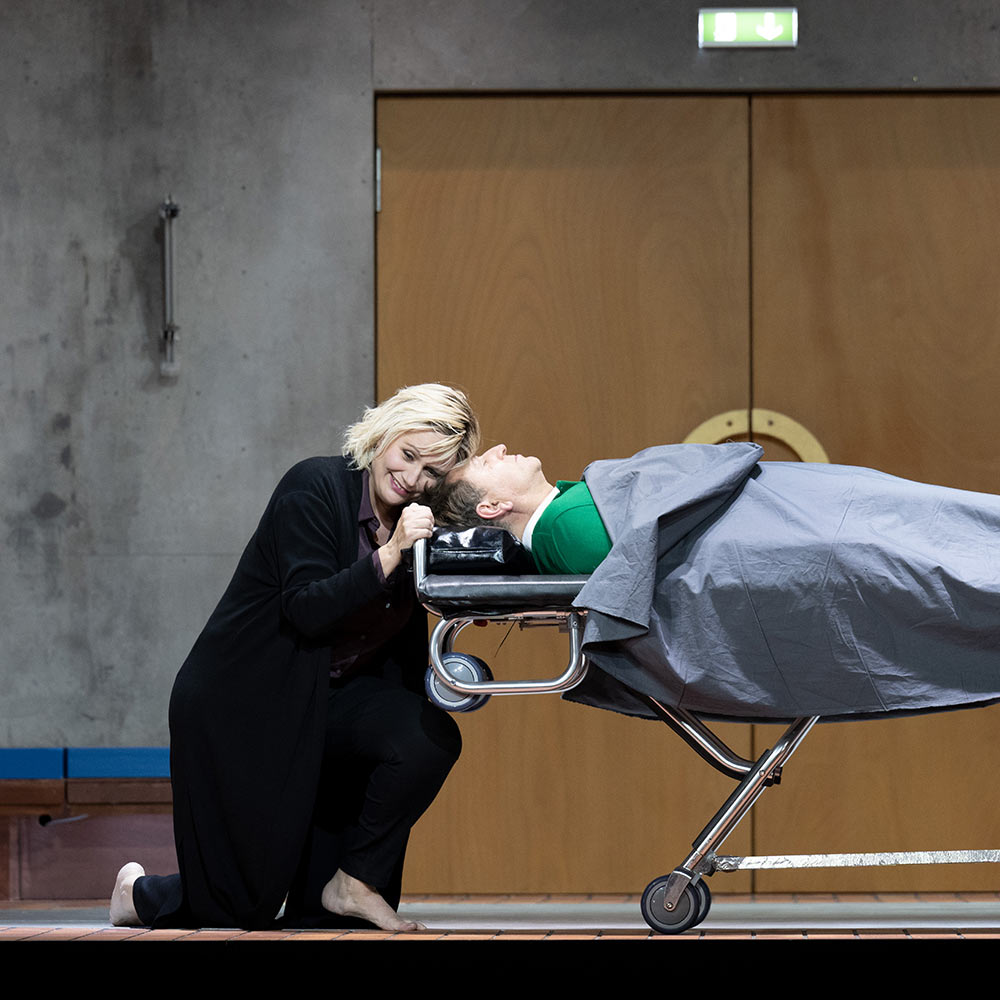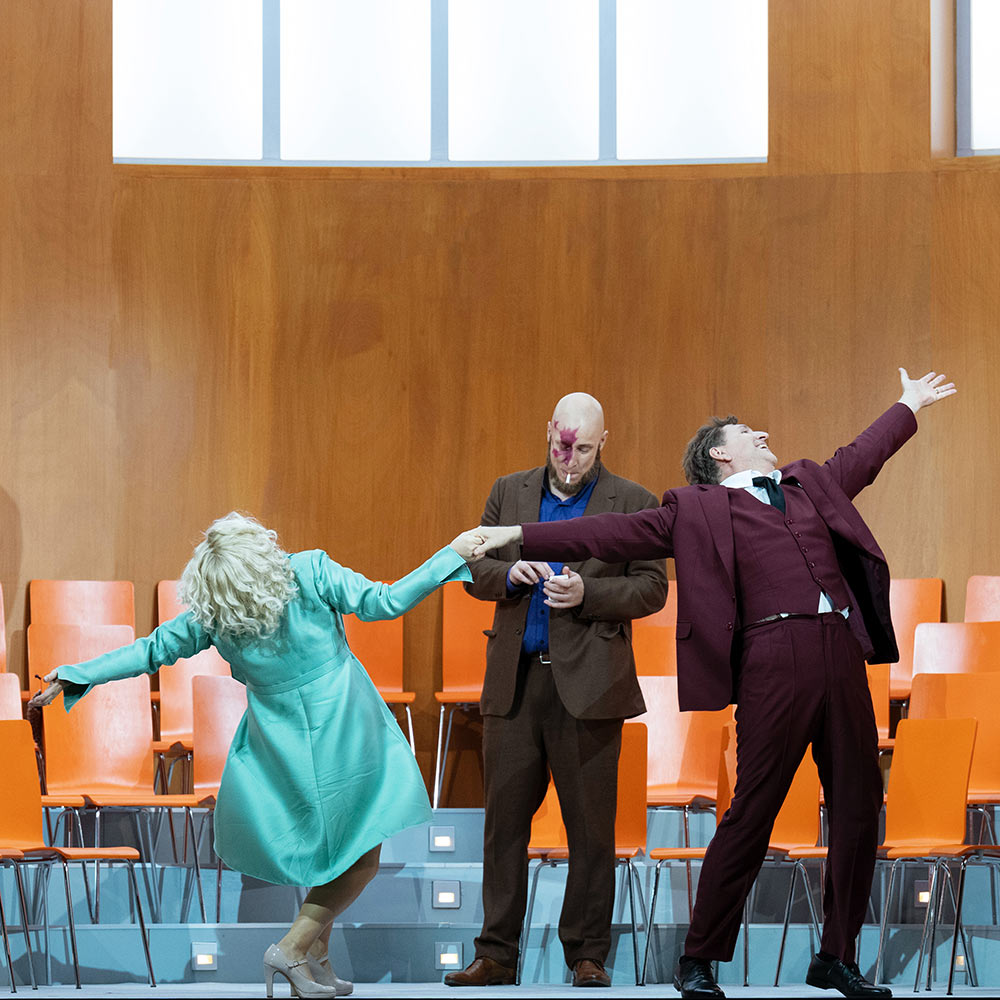Dmitri Tcherniakov: Der Ring des Nibelungen, Götterdämmerung - Staatsoper unter den Linden, Berlin, 2022
Tcherniakov: Götterdämmerung, Staatsoper Berlin

Mika Kares (Hagen) and Johannes Martin Kränzle (Alberich). Hagen never noticed Alberich’s presence physically during their scene together, even when the latter sat on his lap, and appeared to jolt back to reality upon its conclusion after hearing a thud. Photo: Monika Rittershaus
After three nights of Dmitri Tcherniakov’s Ring, I had been left intrigued, but with more than a few unanswered questions on my mind. How much was what we were seeing merely in the minds of the characters? Who was experimenting on whom? Moreover, what, ultimately, was this production trying to say about power, love, freedom etc., through its focus on psychological testing? I would like to be able to report that the final opera in the cycle led me through the fog and brought some clarity, but despite giving myself three days to think about it before writing this review, Tcherniakov’s staging of Götterdämmerung – and in particular, its ending – frankly only added to my confusion.
Parallels between Siegfried and Brünnhilde’s relationship and the forced marriage of Hunding and Sieglinde were set up right from the start, when the curtain rose to reveal the former pair living in what appeared to be an exact recreation of the hut seen in Die Walküre. Following a visit from the Norns, who were now elderly versions of the institute employees (office gossips?) we had periodically seen watching over proceedings, further little clues were left like the presence of a yellow top, the same colour that Sieglinde had been wearing at home. An arranged marriage fixed up by Wotan through psychological control made sense in the context of what had come before, but if it were one, the participants did not appear to be frustrated in it, particularly Brünnhilde, who seemed nothing short of depressed at the thought, and later reality, of Siegfried’s departure. Also posed again at this point, was a question that had been raised during the finales to the previous two operas, that of whether the pair were locked into a childlike mentality. That they were role-playing rather than acting as their true selves seemed once more to be a possibility, as Siegfried retold his slaying of Fafner with a coat hanger for a sword, before playing with the toy Grane, and then dancing gleefully with his wife before departing with a grin on his face.
Perhaps predictably, the Hall of the Gibichungs was set in the research institute we had become so familiar with, only it had had a lick of paint in an attempt to modernise it. Gunther was now at least notionally in charge, having the air of a management consultant who had been brought in to “streamline” a local hospital despite not having the faintest idea about medicine, while Hagen – wearing brown and with a birthmark over one eye in presumable nods to Wotan – was clearly the éminence grise of the operation. Signs that the paint job had not coincided with the facility’s experimental practices and morals also being brought into the 21st century then began to appear, as Gunther and Gutrune openly laughed and mocked Siegfried’s retelling of his adventures, before trying the Tarnhelm on as if they were humouring an infant. Had they read his medical file before his arrival? Either way, it became difficult to deny that his reality was simply whatever he thought it to be when no potion was drunk, making his conversion to Gutrune seem like a Jekyll-and-Hyde pivot to a new acting role. The blood oath, meanwhile, was clearly not part of any experimental plan, as Gunther spent the rest of the scene attempting to hide both his shock and pain from Siegfried.
More suggestions of delusional behaviour followed in the next scenes. First, Alberich, dressed only in a loincloth like a man about to be stoned to death by John Cleese for saying “Jehovah”, appeared before Hagen’s Watch, apparently an hallucinatory image. Later, Siegfried made no attempt to disguise himself as Gunther, yet Brünnhilde clearly seemed horrified. Was her reaction too the product of a changeable mental state, able to create a new reality or person purely from a change in behaviour? It was perplexing. The act then ended just as it had started – with Siegfried reminding us of Hunding, this time by overturning the dining room table. Different subject; same result.
Hagen never noticed Alberich’s presence physically during their scene together, even when the latter sat on his lap, and appeared to jolt back to reality upon its conclusion after hearing a thud. Much of the rest of Act 2 was played relatively straight, with Brünnhilde hurt and defiant, and Siegfried jocular. One of the few directorial tidbits before the final interval was Gunther seeming troubled not by his own embarrassment in front of the vassals (more E.S.C.H.E institute employees), but by the suggestion of Siegfried’s death, telling us that if he had at one stage been on board with Hagen’s plan, he was beginning to get cold feet.
So how would it all end? Would the institute burn to the ground, signalling an end to the cycle of experimentation on people and the ushering in of a new, humane society? Or would a new anonymous test subject, perhaps a child, be ushered into a laboratory during the closing bars? Well, neither as it turned out. Before that though, we returned one last time to the “Stress Labor” of the River Rhine, where the Rhinemaidens took notes on Siegfried as they had previously done with Alberich, sometimes by his own prompting as if he knew he rules of the game. Speaking of games, basketball practice stood in for a hunting party – signifying what, I’m not sure. But in any case, Siegfried was stabbed (after a seemingly regretful goodbye hug from Gunther), and then staggered back into the laboratory, where he painted the walls orange as Brünnhilde had once done in her world of make-believe, before dying in the corner. As his funeral music played, characters came in to see his body one by one: the Rhinemaidens, looking shocked; Gunther, looking distraught; Erda, looking resigned; and Wotan – emotionless.
Wotan continued to watch on as Brünnhilde delivered the opening part of the Immolation Scene directly to him. Was he really there? Or was he to her what Alberich was to Hagen, a memory of a father long gone whose legacy she was forced to live with? Perhaps the latter, as a lack of fire and some talking to the toy Grane were strong indications of a runaway imagination. At the climax of the scene, she climbed on top of his body during her final lines, seemingly very much still alive, while nobody seemed to sing “Zurück vom Ring!”, making me wonder whether it was displayed as a message to the audience.
But the production did not quite end with the usual final words; for as the redemption motif played, the text of Wagner’s unused “Schopenhauer Ending” to the opera was projected on to the stage. Brünnhilde returned, once more carrying a rucksack as she had at the end of Die Walküre, and read the text as it scrolled down. Erda then briefly appeared with the toy woodbird, which she showed to Brünnhilde, who then remained alone, staring out at the audience as the lights came down.

Andreas Schager (Siegfried) and Anja Kampe (Brünnhilde). Photo: Monika Rittershaus
Confused? Me too. But since its kind of my job as a reviewer to take a stab at what it means, here goes. With apologies to all serious scholars for what is no doubt a crude simplification and a bad translation, the Schopenhauer Ending, written in 1856 after Wagner became familiar with the philosopher’s works, might broadly be summed up as changing Brünnhilde’s fate from a redemption through love, into a redemption through the experience of suffering and denial of the will. In this version of the ending, she is “desireless” (“wünschlos”) and has seen the end of the world through “mourning love’s deepest suffering” (“Trauernder Liebe tiefstes Leiden”). Heavy, man. Anyway, turning back to the production, one could perhaps fit this with the idea that the will expressed in her desire for reunion with Siegfried in the standard ending was merely more play acting – her completing her part in Wotan’s experiment. The end of the production then becomes a kind of reawakening for her, a return to the true Brünnhilde somehow brought about by the trauma of her the final scenes. However, even if this were the intent, I’m not sure it works, not least because any kind of reincarnation should be ruled out by the lines in the Schopenhauer Ending that state that she is “redeemed from rebirth” (“von Wiedergeburt erlös’t”). Furthermore, I think the inclusion of the unused text was not really set up by the production as a whole. After all, it would be an odd choice in any attempt at a Schopenhauerian reading of the cycle, already a questionable approach given that the main libretto was written before Wagner was familiar with the philosopher, to portray Wotan as atypically determined to stage-manage events even after the breaking of his spear.

Andreas Schager (Siegfried) and Anja Kampe (Brünnhilde). Photo: Monika Rittershaus
Musically, this was another strong evening. Andreas Schager returned as Siegfried hot on the heels of his tour de force in the previous opera, and was just as impressive as he was three nights earlier. Forget the singing (it was great) – how many heldentenors are better actors than him? Not many that’s for sure. Everyone knows the repertoire is brutally hard to sing just standing still, so his ability to do it while leaping around, or playing basketball (and making the shot) as he did here, is mind boggling. The best in the business at what he does.
As Brünnhilde, Anja Kampe never wavered in her dramatic commitment, which was perhaps the greatest strength of her performance. If some of her top notes were not strictly beautiful, they were always full of the sort of raw emotion needed for the characterisation of someone so troubled. Power wise, she once again matched Schager when it was needed, without ever overdoing it on this evening.
Mika Kares, returning for his third role in the cycle as Hagen, continued to impress. His brooding, sullen portrayal contrasted well with his characterisations of Fasolt and Hunding, while vocally, his sonorous, chesty top notes were a highlight of the evening. Never less than excellent, Johannes Martin Kränzle made Alberich’s scenes predictably watchable, his versatility as an actor and vocal way with the text once again on display.
Lauri Vasar was much better suited to the role of Gunther than he was as Donner, his relatively lighter yet pleasing tone working well in the role. Acting wise, he gave a well-crafted depiction of a weak, conflicted man. As his sister Gutrune, Mandy Fredrich produced the most beautiful sounds of the evening in another good performance.
Evelin Novak, Natalia Skrycka, and Anna Lapkovskaja picked up from where they left off as the Rhinemaidens, complementing each other well. Meanwhile, Noa Beinart, Kristina Stanek, and Anna Samuil provided distinct voices as the Norns. All three did solid work, although perhaps special mention should go to Stanek as 2nd Norn for the extra fullness of tone. Last but not least, Violeta Urmana took her role as Waltraute well, the voice well working as a counterpart to Kampe.
In the pit, Christian Thielemann seemed to employ tempi that were slightly less obviously “slower than you normally hear these days” compared with the previous evenings. That is not to say, however, that the reading lost any coherence – far from it. The music was still allowed enough to time to breathe and reveal lines, and there were certainly never a thought that we were rushing. Balance between stage and pit was spot on, and the playing swelled in waves throughout the night to climactic moments, yet without them feeling like standalone crowd pleasers or any hint of dramatic neglect in between.
Overall, then, this was nothing if not a thought-provoking Ring, and it contained a great deal of fine music making. However, the fact that I still find it difficult to sort out in my head what points Tcherniakov was really trying to make, is problematic. There were running threads for sure: psychological experiments, perhaps cyclical, conducted at the facility over several generations; impacts on the mental health of characters; suggestions that an individual’s psychological state might determine their reality. But even discounting the confusing finish, I’m just still not very sure how they add up to a whole and say anything profound. An experiment, if you like, with a hypothesis, a method, and some results, but to me, no real conclusions.

Mandy Fredrich (Gutrune), Andreas Schager (Siegfried) and Mika Kares (Hagen). Photo: Monika Rittershaus
→ Tcherniakov: Das Rheingold, Staatsoper Berlin, 2022
→ Tcherniakov: Die Walküre, Staatsoper Berlin, 2022
→ Tcherniakov: Siegfried, Staatsoper Berlin, 2022
→ Tcherniakov: Götterdämmerung, Staatsoper Berlin, 2022
More reviews of Dmitri Tcherniakov’s Ring production at Staatsoper Berlin
Das Rheingold
The Rheingold Experiment: Tcherniakov’s new Ring des Nibelungen at the Staatsoper Berlin (Alexandra Richter, bachtrack.com)
Mark Berry: Berlin Festtage (1) - Das Rheingold, Staatsoper Unter den Linden, 4 April 2023
Die Walküre
Mark Berry: Berlin Festtage (2) - Die Walküre, 5 April 2023
Siegfried
Mark Berry: Berlin Festtage (4) - Siegfried, 8 April 2023
Götterdämmerung
Mark Berry: Berlin Festtage (5) - Götterdämmerung, 10 April 2023
Zwei Zimmer, Küche, Bad: Götterdämmerung an der Staatsoper Berlin (Alexandra Richter, bachtrack.com)
The Ring
Review: Berlin Takes Wagner’s Approach to Staging the ‘Ring’. All four parts of Wagner’s epic were presented within a week, in a new production by Dmitri Tcherniakov inspired by the work’s experimental roots. (Joshua Barone, The New York Times)
Outstanding performances can’t save Dmitri Tcherniakov’s new production of the Ring – originally due to have been conducted by Daniel Barenboim – from closing to a barrage of boos (Fiona Maddocks, The Observer)



